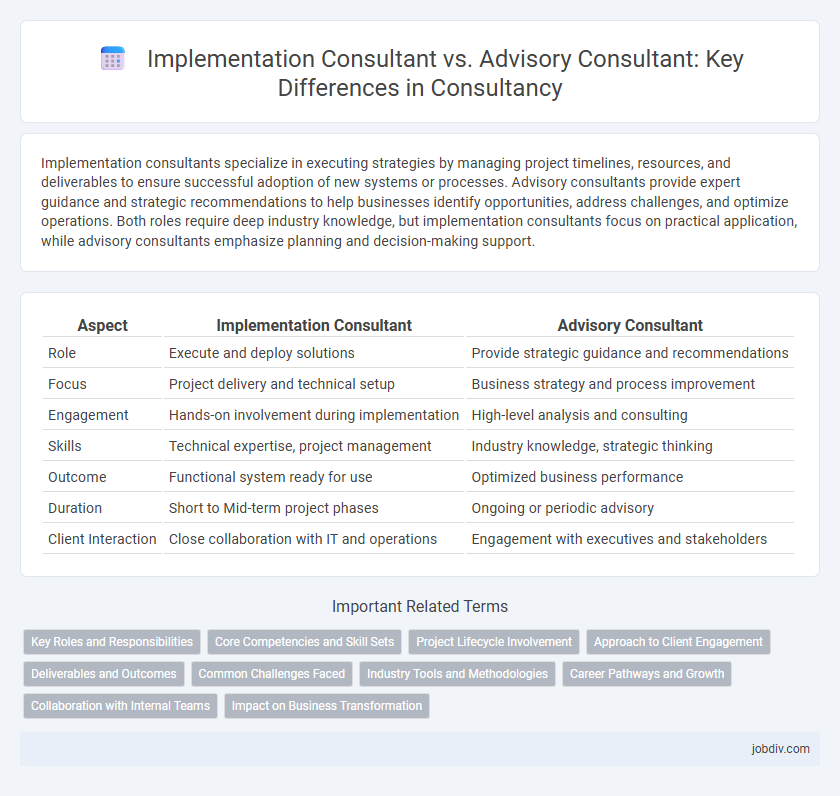Implementation consultants specialize in executing strategies by managing project timelines, resources, and deliverables to ensure successful adoption of new systems or processes. Advisory consultants provide expert guidance and strategic recommendations to help businesses identify opportunities, address challenges, and optimize operations. Both roles require deep industry knowledge, but implementation consultants focus on practical application, while advisory consultants emphasize planning and decision-making support.
Table of Comparison
| Aspect | Implementation Consultant | Advisory Consultant |
|---|---|---|
| Role | Execute and deploy solutions | Provide strategic guidance and recommendations |
| Focus | Project delivery and technical setup | Business strategy and process improvement |
| Engagement | Hands-on involvement during implementation | High-level analysis and consulting |
| Skills | Technical expertise, project management | Industry knowledge, strategic thinking |
| Outcome | Functional system ready for use | Optimized business performance |
| Duration | Short to Mid-term project phases | Ongoing or periodic advisory |
| Client Interaction | Close collaboration with IT and operations | Engagement with executives and stakeholders |
Key Roles and Responsibilities
Implementation consultants specialize in executing and managing projects by applying technical solutions, ensuring timely delivery, and aligning with client requirements. Advisory consultants provide strategic guidance, analyze business processes, and recommend improvements to optimize operations and enhance decision-making. Both roles require strong analytical skills, but implementation consultants focus on practical application while advisory consultants emphasize strategic planning.
Core Competencies and Skill Sets
Implementation Consultants excel in project management, technical integration, and change management, ensuring seamless execution of strategies through hands-on expertise with software deployment and process optimization. Advisory Consultants possess strong analytical skills, strategic thinking, and industry insights, providing high-level recommendations that guide organizational decision-making and long-term planning. Both roles require excellent communication abilities, but Implementation Consultants prioritize practical application while Advisory Consultants emphasize contextual analysis and advisory proficiency.
Project Lifecycle Involvement
Implementation Consultants actively engage throughout the project lifecycle, managing execution phases from planning and development to deployment and post-launch support, ensuring deliverables meet client specifications. Advisory Consultants primarily contribute during the initial phases of the project lifecycle, offering strategic recommendations, risk assessments, and feasibility analyses that guide decision-making and project direction. The distinct involvement of both roles aligns with organizational needs, where Implementation Consultants emphasize operational execution and Advisory Consultants focus on strategic alignment within project lifecycles.
Approach to Client Engagement
Implementation Consultants focus on hands-on involvement, actively managing project execution and technology integration to ensure seamless adoption within client organizations. Advisory Consultants provide strategic guidance, offering insights and recommendations that shape long-term business decisions without directly managing implementation processes. The approach to client engagement differs by emphasizing practical delivery versus consultative strategy development.
Deliverables and Outcomes
Implementation Consultants focus on executing project plans, delivering tangible results such as system setups, process integrations, and training sessions to ensure successful adoption. Advisory Consultants provide strategic insights and recommendations, delivering comprehensive assessments, feasibility studies, and roadmap documents to guide decision-making and long-term planning. Both roles differ in deliverables, with Implementation Consultants emphasizing actionable execution outputs and Advisory Consultants prioritizing analytical reports and strategic frameworks.
Common Challenges Faced
Implementation Consultants often encounter challenges related to aligning technological solutions with existing business processes, managing timelines, and ensuring user adoption during project rollouts. Advisory Consultants face difficulties in providing actionable strategic insights amidst evolving market dynamics, balancing client expectations with feasible recommendations. Both roles require effective communication and stakeholder management to overcome resistance and drive successful outcomes.
Industry Tools and Methodologies
Implementation Consultants specialize in deploying industry-specific tools such as ERP systems, CRM platforms, and cloud solutions, ensuring seamless integration with existing workflows using methodologies like Agile and Waterfall. Advisory Consultants focus on strategic frameworks and best practices, leveraging tools like SWOT analysis, Balanced Scorecard, and market benchmarking to guide decision-making and optimize business processes. Both roles require deep expertise in industry standards such as Lean Six Sigma and ITIL to drive effective transformation and sustained operational excellence.
Career Pathways and Growth
Implementation Consultants specialize in executing project plans and ensuring seamless integration of solutions, providing hands-on experience that often leads to roles in project management or operations leadership. Advisory Consultants focus on strategic analysis and delivering expert recommendations, positioning them for advancement into senior advisory or executive consulting roles. Career growth for Implementation Consultants typically involves deepening technical expertise and operational leadership, while Advisory Consultants progress by enhancing strategic insight and client relationship management.
Collaboration with Internal Teams
Implementation Consultants work closely with internal teams to integrate new systems and processes, ensuring seamless adoption and operational efficiency. Advisory Consultants collaborate with internal stakeholders by providing strategic insights and tailored recommendations that drive informed decision-making. Both roles require strong communication skills and in-depth understanding of organizational goals to foster effective teamwork and successful project outcomes.
Impact on Business Transformation
Implementation Consultants drive business transformation by executing strategic plans, managing technology deployment, and ensuring operational changes align with organizational goals. Advisory Consultants influence transformation through expert guidance, risk assessment, and strategic recommendations that shape decision-making processes. Both roles are critical; Implementation Consultants focus on actionable change, while Advisory Consultants prioritize strategic insight to maximize business impact.
Implementation Consultant vs Advisory Consultant Infographic

 jobdiv.com
jobdiv.com